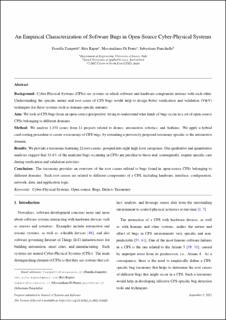Please use this identifier to cite or link to this item:
https://doi.org/10.21256/zhaw-25591| Publication type: | Article in scientific journal |
| Type of review: | Peer review (publication) |
| Title: | An empirical characterization of software bugs in open-source Cyber–Physical Systems |
| Authors: | Zampetti, Fiorella Kapur, Ritu Di Penta, Massimiliano Panichella, Sebastiano |
| et. al: | No |
| DOI: | 10.1016/j.jss.2022.111425 10.21256/zhaw-25591 |
| Published in: | Journal of Systems and Software |
| Volume(Issue): | 192 |
| Issue: | 111425 |
| Issue Date: | 2022 |
| Publisher / Ed. Institution: | Elsevier |
| ISSN: | 0164-1212 1873-1228 |
| Language: | English |
| Subject (DDC): | 005: Computer programming, programs and data |
| Abstract: | Background: Cyber-Physical Systems (CPSs) are systems in which software and hardware components interact with each other. Understanding the specific nature and root cause of CPS bugs would help to design better verification and validation (V&V) techniques for these systems such as domain-specific mutants. Aim: We look at CPS bugs from an open-source perspective, trying to understand what kinds of bugs occur in a set of open-source CPSs belonging to different domains. Method: We analyze 1151 issues from 14 projects related to drones, automotive, robotics, and Arduino. We apply a hybrid card-sorting procedure to create a taxonomy of CPS bugs, by extending a previously proposed taxonomy specific to the automotive domain. Results: We provide a taxonomy featuring 22 root causes, grouped into eight high-level categories. Our qualitative and quantitative analyses suggest that 33.4% of the analyzed bugs occurring in CPSs are peculiar to those and, consequently, require specific care during verification and validation activities. Conclusion: The taxonomy provides an overview of the root causes related to bugs found in open-source CPSs belonging to different domains. Such root causes are related to different components of a CPS, including hardware, interface, configuration, network, data, and application logic. |
| URI: | https://digitalcollection.zhaw.ch/handle/11475/25591 |
| Related research data: | https://doi.org/10.5281/zenodo.4478387 |
| Fulltext version: | Submitted version |
| License (according to publishing contract): | Licence according to publishing contract |
| Departement: | School of Engineering |
| Organisational Unit: | Institute of Computer Science (InIT) |
| Published as part of the ZHAW project: | COSMOS – DevOps for Complex Cyber-physical Systems of Systems |
| Appears in collections: | Publikationen School of Engineering |
Files in This Item:
| File | Description | Size | Format | |
|---|---|---|---|---|
| 2022_Zampetti-etal_Empirical-characterization-of-software-bugs-OS-CPS.pdf | Submitted Version | 744.24 kB | Adobe PDF |  View/Open |
Show full item record
Zampetti, F., Kapur, R., Di Penta, M., & Panichella, S. (2022). An empirical characterization of software bugs in open-source Cyber–Physical Systems. Journal of Systems and Software, 192(111425). https://doi.org/10.1016/j.jss.2022.111425
Zampetti, F. et al. (2022) ‘An empirical characterization of software bugs in open-source Cyber–Physical Systems’, Journal of Systems and Software, 192(111425). Available at: https://doi.org/10.1016/j.jss.2022.111425.
F. Zampetti, R. Kapur, M. Di Penta, and S. Panichella, “An empirical characterization of software bugs in open-source Cyber–Physical Systems,” Journal of Systems and Software, vol. 192, no. 111425, 2022, doi: 10.1016/j.jss.2022.111425.
ZAMPETTI, Fiorella, Ritu KAPUR, Massimiliano DI PENTA und Sebastiano PANICHELLA, 2022. An empirical characterization of software bugs in open-source Cyber–Physical Systems. Journal of Systems and Software. 2022. Bd. 192, Nr. 111425. DOI 10.1016/j.jss.2022.111425
Zampetti, Fiorella, Ritu Kapur, Massimiliano Di Penta, and Sebastiano Panichella. 2022. “An Empirical Characterization of Software Bugs in Open-Source Cyber–Physical Systems.” Journal of Systems and Software 192 (111425). https://doi.org/10.1016/j.jss.2022.111425.
Zampetti, Fiorella, et al. “An Empirical Characterization of Software Bugs in Open-Source Cyber–Physical Systems.” Journal of Systems and Software, vol. 192, no. 111425, 2022, https://doi.org/10.1016/j.jss.2022.111425.
Items in DSpace are protected by copyright, with all rights reserved, unless otherwise indicated.